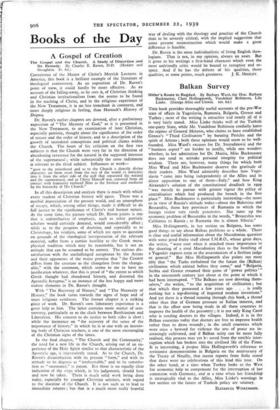Books of the Day
A Gospel of Creation
CONSISTING of the Master of Christ's Merrick Lectures in
America, this book is a brilliant example of the literature of theological controversy. As an exposition of Dr. Raven's point of view, it could hardly be more effective. As an account of the falling-away, as he sees it, of Christian thinking and Christian institutionalism from the norms to be found in the teaching of Christ, and in the religious experience of the New Testament, it is no less trenchant in comment, and more deeply religious in feeling, than Harnack's History of Dogma.
Dr. Raven's earlier chapters are devoted, after a preliminary exposition of " The Mystery of God," as it is presented in the New Testament, to an examination of later Christian, especially patristic, thought about the significance of the order of nature and the order of history, and to a description of the growth of sacerdotal conceptions and political claims within the Church. The heart of his criticism on the first two subjects is that the Church went very far in the direction of abandoning reverence for the natural in the supposed interests of the supernatural ; while substantially the same indictment is relevant to the third subject. Influences at work-
" gave to the priesthood and so to the Church a directly divine character, set them apart from the rest of the world as intruders into it from the other side of the gulf that separated the natural and the supernatural, and as Christ Himself was removed from all contact with humanity replaced Him as the Saviour and mediator by the hierarchy of His Church."
In all this description and analysis there is much with which every student of Christian history will agree. There was a morbid depreciation of the present world, and an atmosphere of escape, which, among other things, made it difficult to do full justice to the significance of Christ's real human nature.
At the same time, the picture which Dr. Raven paints is one that a redistribution of emphasis, such as other patristic scholars would certainly demand, would considerably affect ; while as to the progress of doctrine, and especially as to Christology, his verdicts, some of which are open to question on grounds of the theological interpretation of the relevant material, suffer from a certain hostility to the Greek meta- physical tradition which may be reasonable, but is not an attitude that can be assumed to be correct. The curious dis- satisfaction with the unchallenged acceptance by the Arians and their opponents of the major premise that " the Creator differs from the creature as the changeless from the change- able," with the comment, which seems to me to have no justification whatever, that this is proof of " the extent to which Greek thought had abandoned history, and distorted the Apostolic kerygma," is an instance of the less happy and more violent elements in Dr. Raven's thought.
With " The Recovery of Nature," and " The Necessity of History," the book turns towards the signs of hope and of truer religious syntheses. The former chapter is a striking piece of work. Dr. Raven's own laboratory experience is a great help to him. The latter contains more matter of con- troversy, particularly as to the clash between Barthianism and Liberalism. His concern to do justice to both sides is clear ; while the insistence on " the recovery of the sense of the importance of history," in which he is at one with an increas- ing body of Christian teachers, is one of the most encouraging of the Christian signs of the times.
In the final chapter, " The Church and the Community," the need for a new life in the Church, arising out of an ex- perience of the Holy Spirit similar to that characteristic of the Apostolic age, is impressively stated. As to the Church, Dr. Raven's dissatisfaction with its present " form," and with its attitude to its dogmas as " irreformable," and to its constitu- tion as " sacrosanct," is patent. But -there is no equally clear indication of the steps which, in his judgement, should here and now be taken. There is much solid work being done today, especially by younger Christian scholars, with regard to the doctrine of the Church. It is not such as to lead to immediate returns ; but that is a much more really hopeful way of dealing with the theology and practice of the Church than to be severely critical, with the implied suggestion that some present reconstruction which would make a great difference is feasible.
Dr. Raven is the most individualistic of living English theo- logians. That is not, in my opinion, always an asset. But it gives to his writings a first-hand character which even the most unfriendly critic would be bound to recognise and re- spect. And if he has the defects of his qualities, those
qualities, at some points, touch greatness. J. K. MOZLEY.




































 Previous page
Previous page